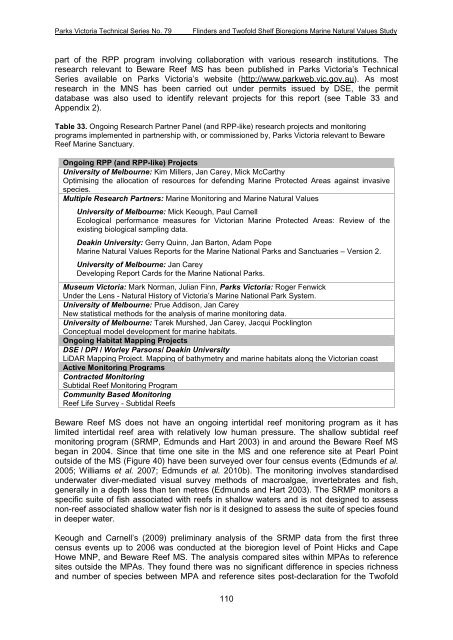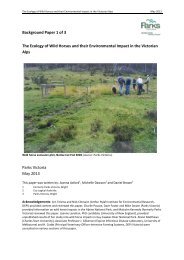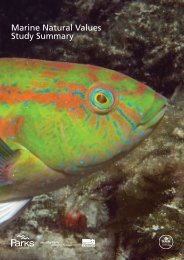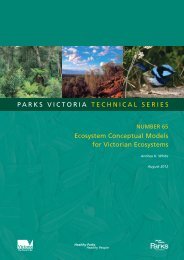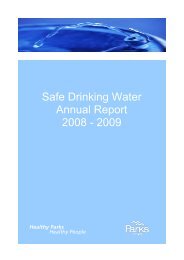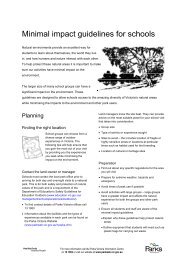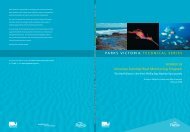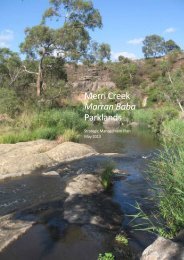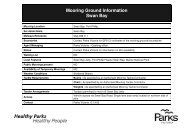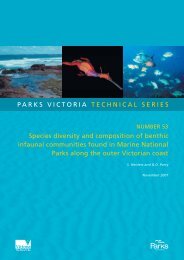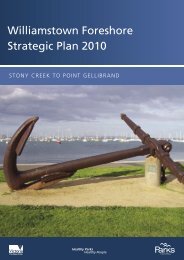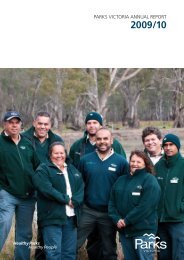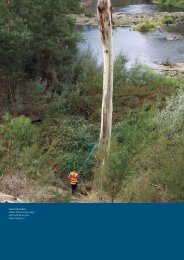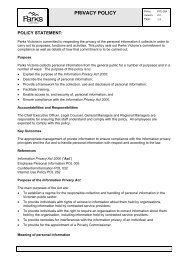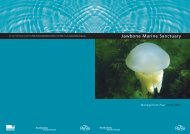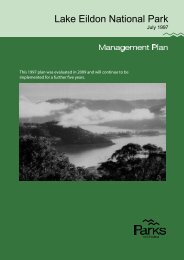parks victoria technical series marine natural values study vol 2 ...
parks victoria technical series marine natural values study vol 2 ...
parks victoria technical series marine natural values study vol 2 ...
You also want an ePaper? Increase the reach of your titles
YUMPU automatically turns print PDFs into web optimized ePapers that Google loves.
Parks Victoria Technical Series No. 79<br />
Flinders and Twofold Shelf Bioregions Marine Natural Values Study<br />
part of the RPP program in<strong>vol</strong>ving collaboration with various research institutions. The<br />
research relevant to Beware Reef MS has been published in Parks Victoria’s Technical<br />
Series available on Parks Victoria’s website (http://www.parkweb.vic.gov.au). As most<br />
research in the MNS has been carried out under permits issued by DSE, the permit<br />
database was also used to identify relevant projects for this report (see Table 33 and<br />
Appendix 2).<br />
Table 33. Ongoing Research Partner Panel (and RPP-like) research projects and monitoring<br />
programs implemented in partnership with, or commissioned by, Parks Victoria relevant to Beware<br />
Reef Marine Sanctuary.<br />
Ongoing RPP (and RPP-like) Projects<br />
University of Melbourne: Kim Millers, Jan Carey, Mick McCarthy<br />
Optimising the allocation of resources for defending Marine Protected Areas against invasive<br />
species.<br />
Multiple Research Partners: Marine Monitoring and Marine Natural Values<br />
University of Melbourne: Mick Keough, Paul Carnell<br />
Ecological performance measures for Victorian Marine Protected Areas: Review of the<br />
existing biological sampling data.<br />
Deakin University: Gerry Quinn, Jan Barton, Adam Pope<br />
Marine Natural Values Reports for the Marine National Parks and Sanctuaries – Version 2.<br />
University of Melbourne: Jan Carey<br />
Developing Report Cards for the Marine National Parks.<br />
Museum Victoria: Mark Norman, Julian Finn, Parks Victoria: Roger Fenwick<br />
Under the Lens - Natural History of Victoria’s Marine National Park System.<br />
University of Melbourne: Prue Addison, Jan Carey<br />
New statistical methods for the analysis of <strong>marine</strong> monitoring data.<br />
University of Melbourne: Tarek Murshed, Jan Carey, Jacqui Pocklington<br />
Conceptual model development for <strong>marine</strong> habitats.<br />
Ongoing Habitat Mapping Projects<br />
DSE / DPI / Worley Parsons/ Deakin University<br />
LiDAR Mapping Project. Mapping of bathymetry and <strong>marine</strong> habitats along the Victorian coast<br />
Active Monitoring Programs<br />
Contracted Monitoring<br />
Subtidal Reef Monitoring Program<br />
Community Based Monitoring<br />
Reef Life Survey - Subtidal Reefs<br />
Beware Reef MS does not have an ongoing intertidal reef monitoring program as it has<br />
limited intertidal reef area with relatively low human pressure. The shallow subtidal reef<br />
monitoring program (SRMP, Edmunds and Hart 2003) in and around the Beware Reef MS<br />
began in 2004. Since that time one site in the MS and one reference site at Pearl Point<br />
outside of the MS (Figure 40) have been surveyed over four census events (Edmunds et al.<br />
2005; Williams et al. 2007; Edmunds et al. 2010b). The monitoring in<strong>vol</strong>ves standardised<br />
underwater diver-mediated visual survey methods of macroalgae, invertebrates and fish,<br />
generally in a depth less than ten metres (Edmunds and Hart 2003). The SRMP monitors a<br />
specific suite of fish associated with reefs in shallow waters and is not designed to assess<br />
non-reef associated shallow water fish nor is it designed to assess the suite of species found<br />
in deeper water.<br />
Keough and Carnell’s (2009) preliminary analysis of the SRMP data from the first three<br />
census events up to 2006 was conducted at the bioregion level of Point Hicks and Cape<br />
Howe MNP, and Beware Reef MS. The analysis compared sites within MPAs to reference<br />
sites outside the MPAs. They found there was no significant difference in species richness<br />
and number of species between MPA and reference sites post-declaration for the Twofold<br />
110


